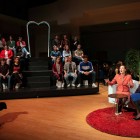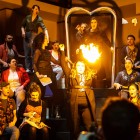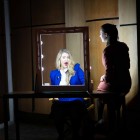Trouble in Tahiti 2019Royal Conservatoire of Scotland
Read more about the opera Trouble in Tahiti
Bernstein wrote Trouble in Tahiti in 1952. It therefore precedes most of his acknowledged master-works for the musical stage, including Candide and West Side Story. If those two are generally considered to represent the forms of Operetta and Broadway Musical, respectively, there is no doubt that Trouble in Tahiti is an opera, if a very brief and razor-sharp example of the genre.
It has suffered from a serious level of neglect. Bernstein clearly felt unhappy about this, to the point where, towards the end of his life he composed a second opera, A Quiet Place, which actually inserted the earlier work at its heart. This even took its title from a memorable lament sung by Dinah, which also gave a brief foretaste of the superb ''Somewhere - There's a Place for us' number in West Side Story.
Trouble in Tahiti has recently received professional attention from Opera North, as one of a whole series of one act operas that have been staged in Leeds and elsewhere. It has also been produced by the students of the RNCM in Manchester. However in Scotland we know only of its premiere at Ledlanet in 1964, when it was performed in a reduction of the score for piano. These performances therefore seem to be the Scottish premiere of the orchestral version. On opening night, Anthony Kraus drew a superbly crisp jazz-inspired accompaniment from a squad of seven players concealed behind the set. There were no difficulties with ensemble, and only brief flurries when the musicians' enthusiasm ran the risk of overwhelming the singers.
Where the modern concept of director Maxine Braham was slightly uneasy in the first work of the evening, Purcell's Dido and Aeneas, for the Bernstein it worked brilliantly, highlighting the difficult state the marriage of Sam and Dinah has reached. The youngish couple, are almost entirely alienated from one another, and recognize the fact, while having little idea of how to amend the situation.
Sam is distinctly self-centred - not interested enough in their son to prioritise attendance at the boy's dreaded school play over his fading prowess as a competitive sportsman. He has also - rather topically - had a brief flirtation with his secretary, which seems to have fizzled out. When he meets Dinah in the street at lunch-time they both instinctively lie about their actions, immediately regret the fact, but do nothing about it. Dinah spends the afternoon at the cinema, dozing through a trivial piece of Hollywood nonsense, (called Trouble in Tahiti) and in the evening the couple go out, seeing the same film. Fiiona Joice and Arthur Bruce don't put a foot wrong as this rather sad and embittered couple. He may have gained from his previous experience, having sung Sam in that student production in Manchester.
The other vocal contribution is from a jazz trio, soprano, tenor and baritone (thus avoiding comparison with groups such as the Andrews Sisters). Much of their singing is in traditional close harmony, but here the director had a remarkable success in differentiating them and projecting them as representatives of the 'American Dream' so important for Sam and Dinah (not to mention other Bernstein characters in On the Town and West Side Story). They are named in the programme and successfully characterised, so the lady becomes Hedy Lamarr, one of the stars of 'thirties cinema, but more importantly, a refugee from the Nazis who was herself a talented scientist. She invented (but was not acknowledged for) a form of radio signalling that was used with success by the US Navy against the U-boat threat. The tenor represented William J Levitt, the designer of mass-produced housing, perhaps immortalised by Pete Seeger as 'little boxes on the hillside - all made of ticky-tacky and they all look just the same.' The third singer represented the big movie studios - dressed in plus-fours and chomping a cigar. These three added enormously to the enjoyment of the piece.
It was performed as part of a double bill following Purcell's most popular opera. This production of Dido and Aeneus was also in a contemporary style, and while that was not especially effective, it did no damage to what was a very strong musical performance.



